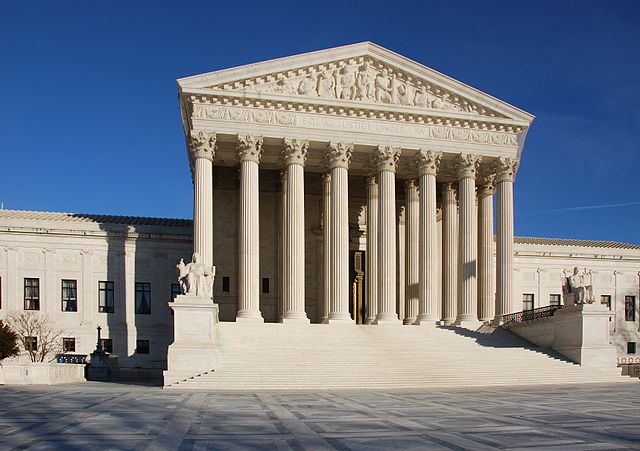
US Supreme Court - corrected
(Image by (From Wikimedia) Jarek Tuszyński, Author: Jarek Tuszyński) Details Source DMCA
On June 23 the US Supreme Court ruled, in Birchfield v. North Dakota, that police officers may require suspected drunk drivers to take breathalyzer tests without warrants as required by the US Constitution's Fourth Amendment and under criminal penalty should they refuse. The court did go so far as to leave the constitutional warrant requirement intact for blood tests. Associate Justice Samuel Alito, writing for the majority, lays out the chilling logic for differentiating between the two:
"Because breath tests are significantly less intrusive than blood tests and in most cases amply serve law enforcement interests, a breath test, but not a blood test, may be administered as a search incident to a lawful arrest for drunk driving. No warrant is needed in this situation. "
Searching the shed behind my house would certainly be "significantly less intrusive" than searching my closet or requiring me to open the lock box in which I keep important personal documents. Does this mean that the police should be free to poke around in my shed without procuring a warrant based on probable cause to believe I've committed a crime, if doing so happens to "amply serves their interests?" No, it doesn't. The Fourth Amendment's prohibition on unreasonable searches and seizures isn't there for the convenience of law enforcement. It's there to protect everyone else's rights from abuses BY law enforcement.
And the thing is, it's never been easier for the cop on the street to get a warrant within minutes, or to prove that the warrant application is (or was) justified. Most jurisdictions have judges "on call" to handle warrant applications 24/7. Between radios and cell phones, police officers are almost never unable to communicate with their departments or with those judges. Cell phone video, dash camera video and, more and more lately, body camera video are all available for reference to establish that probable cause exists (or, in retrospect, existed).
Laws requiring drivers to acquiesce in breathalyzer tests absent warrants -- as well as other unconstitutional excesses such as random "DUI checkpoints" where drivers are stopped and interrogated absent any reason at all to believe they've committed crimes -- aren't about fighting drunk driving or making the roads safe.
These laws are about making law enforcement's job easier. Which sounds nice, but gets things backward. A peace officer's job is to keep the peace by the rules, easy or not. Absent those rules, cops become the public's enemies rather than its servants.
These laws are about greasing the squeaky wheel. Mothers Against Drunk Driving (MADD), a tired special interest group that has long since fulfilled its founder's purpose, is now mostly interested in keeping its revenues (more than $30 million per year as of 2013) coming by lobbying against the rights of those Americans who aren't among its 400-plus employees.
And yes, these laws are at least a little bit about reminding the serfs just who's in charge.
What these laws are not is constitutional. And that should be the only thing the Supreme Court considers in its deliberations.




